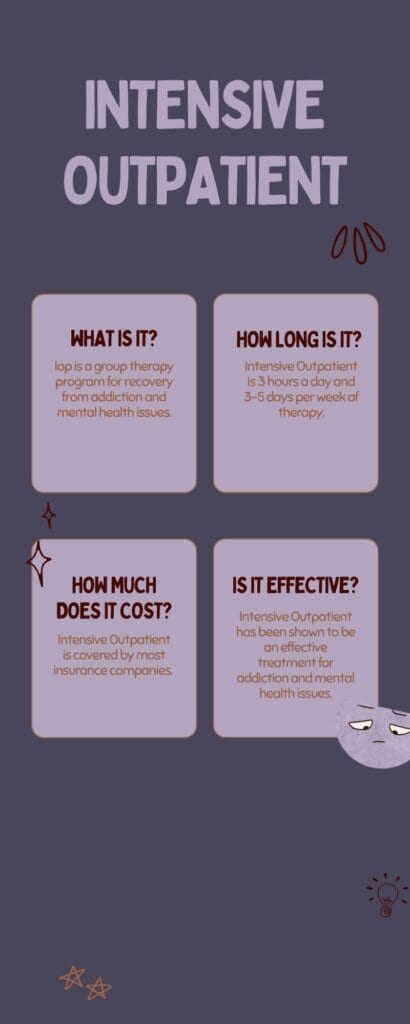Trauma Intensive Outpatient Programs Massachusetts
Opening doors to healing: Trauma Intensive outpatient programs in Massachusetts open doors to resilient trauma recovery.
Hey folks, what are your thoughts? Do you think recovering from trauma is a means of thriving in life rather than merely surviving it?
At least one traumatic event occurs in the lives of 70% of adults. It has been revealed that psychiatric populations have a higher prevalence of trauma exposure than the overall population. Are traumatic occasions essentially part of life?
Yes! It is. Traumas are unavoidable parts of being human.
Why Do We Need to Address Trauma Intensive Outpatient Programs Massachusetts?
Traumas unavoidably occur in life and alter our experiences and viewpoints. Determining them, building resilience, and getting help can result in personal development and recovery. Treating trauma in IOP programs is vital to give patients care who have gone through traumatic familiarity.
Are you interested in learning more about the trauma-transforming strategies in mental health programs? Let’s explore and discuss with us.
Significance of Addressing Trauma:
In Massachusetts, trauma treatment in IOP programs is critical because it affects general health and the ability to heal. Unprocessed trauma can obstruct therapeutic growth, worsen indications of mental illness, and stop patients from contributing efficiently to treatment. Understanding the significant and prevalent effects of trauma creates individualized and comprehensive mental health interferences.
It results in a public that is more capable and resilient. Massachusetts can recover the healing environment and foster safety, trust, and healing. For those who are looking for support in their mental health trip, this active method can help. It talks about the immediate mental health drills that aid their long-term recovery and quality of life.
Top 10 Tactics Used In Trauma Intensive Outpatient Programs Massachusetts
The following are some essential tactics used in intensive outpatient mental health programs to address trauma:
1. Staff Education and Training:
Thorough staff education and training is the first step towards guaranteeing the effectiveness of Massachusetts’s IOP programs. Providing mental health professionals with training emphasizing sensitivity and understanding for providing trauma-informed care. Continuous training should cover the most recent findings, therapeutic approaches, and cultural sensitivity.
It creates an atmosphere where staff members are trained in handling trauma-related concerns. With a combination of psychosocial and pharmacological actions and supports, 70–90% of people notice decreased symptoms. It will upgrade their quality of life overall.
2. Creating a Safe Environment:
The establishment of a safe and encouraging environment is a fundamental component of trauma-focused intensive outpatient programs. While policies must prioritize confidentiality and trust, physical spaces should be designed to encourage safety and comfort. Trauma-sensitive techniques such as clear communication and empowerment make people feel safer and more involved in the therapies.
3. Trauma Screening and Assessment:
Assessing and adjusting trauma and interventions accordingly requires detailed assessment and screening. Standardized trauma assessments can collect detailed information, allowing individualized treatment plans. Frequent reassessments are necessary to make necessary adaptations to interventions. They guarantee a flexible and dynamic approach to participants’ varying needs.
4. Customized Care Plans:
Given the variety of trauma experiences, individual needs should be considered when designing care plans. Program effectiveness is amplified when interventions are custom-made according to trauma severity, type, and cultural factors. Experts incorporate research-proven methods like cognitive behavioral Therapy (CBT) and eye movement desensitization and reprocessing (EMDR) into treatment routines. Customized care plans offer a multifaceted and comprehensive method of trauma retrieval in intensive outpatient situations in Massachusetts.
5. Therapies with a Trauma Focus Care:
To address the compound needs of persons, Massachusetts’ Intensive Programs give importance to evidence-based therapies with a trauma concentration. To help in healing and intervention for those impacted by trauma, strategies like desensitization and behavioral Therapy are used widely. It offers an encouraging and secure space to inspect and work through their shocking experiences. The packages hope to build advanced long-term healing and resilience.
6. Cultural Proficiency:
IOP Health Programs place high importance on social proficiency in recognition of Massachusetts’ varied population. The incorporation of socially sensitive therapeutic methods promises pertinence and inclusivity. Therapists assimilate culturally capable and experienced interventions to boom with their clients’ backgrounds. These packages adopt an environment where individuals from diverse backgrounds feel understood, accepted, and more interested in their curative process.
7. Peer Assistance:
Peer support is essential in Massachusetts’ intensive outpatient mental health programs. Programs for peer assistance are implemented to encourage a sense of belonging and common experience among participants. Trained peer supporters offer sympathetic understanding and encouragement. This peer connection improves the therapeutic process by fostering a collaborative approach to healing and lowering feelings of isolation. Through shared narratives and mutual support, participants find strength and motivation to overcome obstacles.

8. Working Together with Local Resources:
Massachusetts’s success with intensive outpatient mental health programs depends on working with local resources. These initiatives forge solid alliances with social service agencies, medical facilities, and neighborhood associations to offer clients various support options. They put people in touch with additional resources like housing assistance, vocational training, and substance abuse programs. This cooperative strategy fosters a more resilient and empowered community while enhancing the overall impact of mental health.
9. Regular Consultation and Supervision:
To effectively address trauma, Massachusetts’ Intensive Outpatient Mental Health Programs prioritize regular consultation and supervision. Consistent cooperation between mental health providers guarantees a thorough comprehension of every patient’s difficulties. By working together, therapists can exchange ideas, improve treatment strategies, and provide a range of viewpoints on trauma interventions. Regular consultations also enable timely modifications to treatment plans, encouraging a flexible and tailored approach.
10. Tracking Outcomes and Continuous Improvement:
Monitoring treatment outcomes is essential to improve trauma interventions and strategies in the ever-changing mental health field. Massachusetts’s IOP health programs highly value closely monitoring patient progress via outcome assessments and feedback systems. Frequent assessment of healing effectiveness allows data-driven decision-making, assuring that interferences meet enduring needs and healing objectives. Mental health physicians can enhance and modify their approaches, resulting in a more efficient and flexible structure for treating trauma.
Benefits of Addressing Trauma:
- Tailored Support: Massachusetts intensive outpatient mental health programs provide modified treatment plans to address each patient’s exclusive needs.
- Community Connection: Members gain a feeling of belonging, which creates a safe space that promotes candid communication and the sharing of coping mechanisms.
- Flexibility: These programs offer suppleness so people can continue daily activities and tasks while getting thorough trauma-focused care.
- Holistic Methods: By utilizing all-inclusive methods, these packages grab trauma from numerous perspectives, taking into account emotional, mental, and physical health.
- Development of Skills: Contributors gain resilience-enhancing methods and managing mechanisms to deal with triggers and obstacles related to their traumas.
- Continuity of Care: Intensive outpatient programs enable a continuum of care by providing continuing monitoring and support to encourage long-term recovery.
- Cost-Effective: Intensive outpatient programs are frequently less expensive than inpatient alternatives. It opens access to high-quality trauma care for a wider spectrum of Massachusetts residents.
Conclusion:
Massachusetts’s devotion to refining mental health services via trauma-sensitive care is a step in the correct direction toward all-inclusive healing. Intensive outpatient mental health programs in Massachusetts must address trauma to promote full recovery.
Acknowledging the universal influence of trauma on people’s mental health emphasizes the need for focused interventions. These programs incorporate trauma-informed methodologies, fostering recovery and resilience. It also offers modified care plans that understand every individual’s discrete challenges and sort out them according to needs.
The state’s exertions to recover and broaden trauma-focused interferences will lead to more person-centered and efficient mental health services.
How Can You Seek Trauma-Focused Care In Massachusetts?
Hey, do you want to get access to intensive outpatient mental health services for trauma in Massachusetts?
Don’t worry more; the Resilience Behavioral Health Team is here to provide complete guidance.
By utilizing evidence-based methods, tailored interventions, and ongoing support, the Resilience Behavioral Health Team improves the efficacy of the IOP. It helps you to develop coping strategies, supporting community and members’ long-term mental health. So why not pick up the phone, call us at 888.401.1179, and boost your mental health?
We are looking forward 🙂


